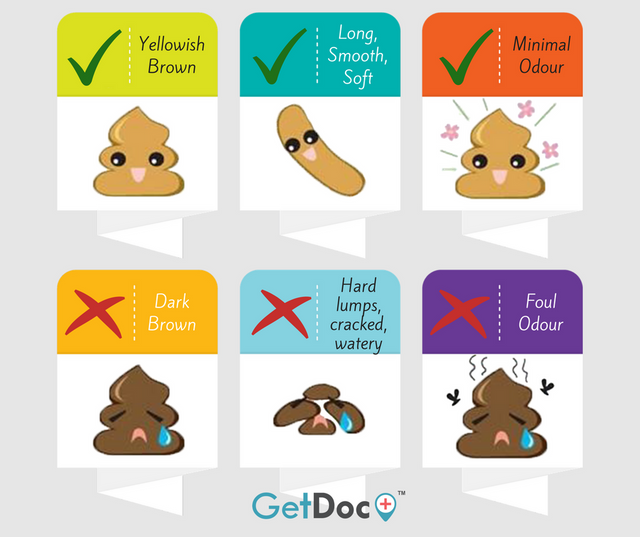
Potty, poop, stools – it has various names but still a kind of taboo topic. We make jokes about it, and talk all hushed up when this topic arises. But it is a part and parcel of our daily routine, our daily lives, isn’t it? If we do not pass motion, there is a problem, it is important to remember that there is no reason to be ashamed to ask questions about bowel movements. We need to be broad-minded in issues like this; it is after all a natural phenomenon!
Still not convinced as to why we must discuss this topic at this time of the day? March is Colon Cancer Awareness Month and definitely the right time to talk about poop — what comes out of your body tells you a lot about your digestive and gastrointestinal and health.
#1. Let’s learn about our bowel movement:
Bowel movements occur at the very end of the digestive process, thus they are said to be one of the best indicators of whether or not your body is digesting food properly. That brown blob looking back at you from the toilet bowl is what is left after all the nutrients are absorbed by the body. Passing stools is important for health as it is the body's natural way of expelling waste. So the way your poop looks and smells can indicate what is happening inside your body. Should you listen to your stool? Yes!
#2. What about the colours of poop?
You would have probably noticed, normally the colour of stool is brown. But at times, it can have a hue different from the usual colour. It could be green, red, white or even black! Most of the time, minor changes in the colour of your waste are due to diet. Eating greens, beet etc. can cause the colour to change from brown to green or deep red. The colour is the result of what you eat and also how much bile is in your stool. Bile is a fluid produced by the liver to digest fats. It starts out as a yellowish green colour. But as the pigments that give bile its colour travel through the digestive system, they go through chemical changes and turn brown.
If the colour you see before you flush worries you, speak to your doctor.

#3. What if the stool is hard, in pieces, and you have to strain to pass it?
Well, that’s an indication of constipation! Um… you probably already knew that. However, some people assume that if they pass their stools every day then they are not constipated. If your stool is consistently hard and comes out in pieces rather than as a single, soft piece that passes without much effort, you may be constipated. The most common cause for this is inadequate intake of fibre.
#4. How to avoid this?
Make it a point to read labels of packed foods – check for fibre content. Also try keeping a food journal for a week to track how much fibre you are actually consuming. If you are falling short, bulk up your diet with additional vegetables, fruits, whole grains, nuts, beans, and seeds.
#5. What if your poop is very loose, but not diarrhoea?
That can be an indication that you have celiac disease. However, this can be rare since it affects only about 1% of the population. Your stool could give you an indication that you may be having it – possibly the only indication. People who cannot tolerate gluten will most likely have this disease. Consumption of gluten destroys villi which are tiny, finger-like protrusions lining our small intestines. This results in an inability to absorb nutrients from the foods consumed. So this explains the loose stools you could experience several times a day.
Discuss with your doctor if you need to be screened for the disease. Switching to a gluten-free diet can aid absorption, improve your stools, and take care of any other related symptoms such as pain, fatigue, bloating, rashes or depression.
#6. What if your poop floats instead of sinking?
This could mean that you have excess gas in your digestive tract. If your meals consist of larger portions of sprouts, beans, cabbage, or very large meals, it’s perfectly normal for stool to float because of gas. But don’t worry about it. However, if the stools float more often or if you spot an “oil-slick” appearance, it could possibly mean that fats are not being absorbed properly from food by the body. For instance, infection or an inflammation in the pancreas could prevent the production of enough digestive enzymes. A food allergy or infection could also be damaging the intestinal lining which in turn affects absorption, too.
You could request your doctor for a stool sample test to see if there is fat that shouldn’t be there. Additional tests may be needed to unearth the cause of the problem.
#7. What if your poop comes out as "exploding" liquid and seaweed green in colour?
This can indicate that you may be having an infection - a Clostridium difficile infection. Doctors say that this is becoming a lot common these days and are seen to occur usually after a course of antibiotics. This bacterium is a normal part of your intestinal flora but consumption of antibiotics can kill the good bacteria that normally keep C. difficile in check. As a result, the bacteria may proliferate uncontrollably and cause serious stomach issues that can lead to dehydration, at times even hospitalization, and in extreme cases may even be deadly.
Call your doctor immediately. If you are on a course of antibiotics, enquire if you should stop.
#8. What if your poop is Pencil-thin?
It may mean that you are constipated, or it could be an indication of rectal cancer. If you notice such stools for a day or two, it should probably not be an issue. It can occur if you are constipated and straining a lot. This prevents the muscles in the anal sphincter from opening and can narrow the way stool comes out. Increasing the amount of fibre in your diet can help. But if the issue continues it could indicate rectal cancer. In rectal cancer, the tumour is fixed and rigid and encircles the rectum thereby resulting in less space for stool to squeeze through so it appears very thin and stringy.
If in doubt, talk to your doctor and get a colonoscopy done. This can evaluate the situation better.
#9. Could your poop be telling you something?
Your stools can also be an indicator of colon cancer which is said to be among the top 5 cancers in Malaysia. There is typically a change in bowel habits, diarrhoea or constipation – narrow stools may be seen. There may even be blood seen in the stools (red/dark blood) in the absence of haemorrhoids along with abdominal pain, discomfort and/or bloating.
References:
LiveWell
Prevention
Read the original article HERE

This is Chris, and I am the Co-Founder of GetDoc. All articles was written original by our team in GetDoc, and posted originally HERE.
Chronic constipation is often linked to chronic dehydration.
Downvoting a post can decrease pending rewards and make it less visible. Common reasons:
Submit
Good point! And lack of fiber too!
Downvoting a post can decrease pending rewards and make it less visible. Common reasons:
Submit
Omg didn't know our poops can tell us so much 😅 Thanks for the info!
Downvoting a post can decrease pending rewards and make it less visible. Common reasons:
Submit
You are welcome! ^^
Downvoting a post can decrease pending rewards and make it less visible. Common reasons:
Submit
Hi! I am a robot. I just upvoted you! I found similar content that readers might be interested in:
https://www.getdoc.co/poop-indicator/
Downvoting a post can decrease pending rewards and make it less visible. Common reasons:
Submit
Interesting! I vouch to this article. Poop does tells a story abt one's health heheheh
Downvoting a post can decrease pending rewards and make it less visible. Common reasons:
Submit
Exactly! Do look at it every single day! 😁 💩
Downvoting a post can decrease pending rewards and make it less visible. Common reasons:
Submit